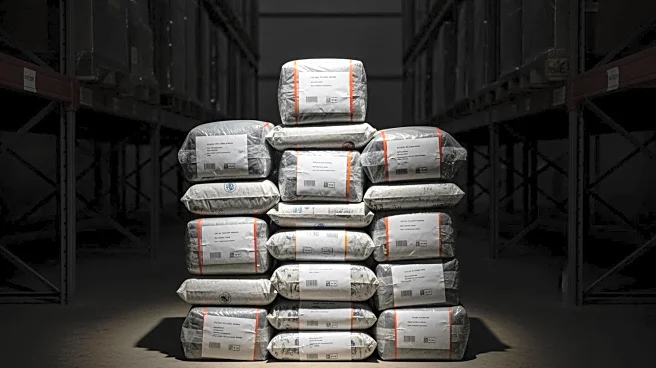What's Happening?
The United Nations and its agencies are facing significant challenges in delivering humanitarian aid to Gaza due to the closure of key border crossings. The World Food Program (WFP) is currently supplying
approximately 560 tons of food daily, but the quantity remains insufficient to meet the severe hunger conditions in the region. The situation is exacerbated by destroyed roads and limited operational crossings, particularly in the north where the famine is most acute. The Israeli military has informed the UN that it will reduce the amount of aid entering Gaza, citing delays in the release of Israeli hostages' remains as a key issue. Despite these challenges, efforts are underway to increase food production within Gaza, with nine bakeries producing over 100,000 bread bundles daily.
Why It's Important?
The ongoing humanitarian crisis in Gaza has significant implications for regional stability and international relations. The restricted flow of aid exacerbates the already dire living conditions for the population, pushing them closer to starvation. This situation not only affects the immediate well-being of Gaza's residents but also poses a challenge to international humanitarian norms and the effectiveness of global aid organizations. The tension between Israel and Hamas over the release of hostages further complicates diplomatic efforts to resolve the crisis. The international community, including the United Nations, faces pressure to find a sustainable solution that ensures the delivery of essential aid while addressing the underlying political conflicts.
What's Next?
The UN and its partners are likely to continue negotiations with Israeli authorities to secure more consistent and increased access for aid deliveries. There may be increased diplomatic efforts to address the hostage situation, which is a significant barrier to aid flow. Additionally, the UN is working to expand food production capabilities within Gaza, aiming to open more bakeries and increase meal distribution. The international community will be closely monitoring the situation, and further developments could influence broader geopolitical dynamics in the Middle East.
Beyond the Headlines
The humanitarian crisis in Gaza highlights the complex interplay between humanitarian aid and political conflict. The situation raises ethical questions about the use of aid as a bargaining tool in political negotiations. It also underscores the need for robust international mechanisms to ensure that humanitarian assistance is not hindered by political disputes. Long-term, the crisis could lead to shifts in international policy regarding conflict zones and the role of humanitarian organizations in such contexts.









